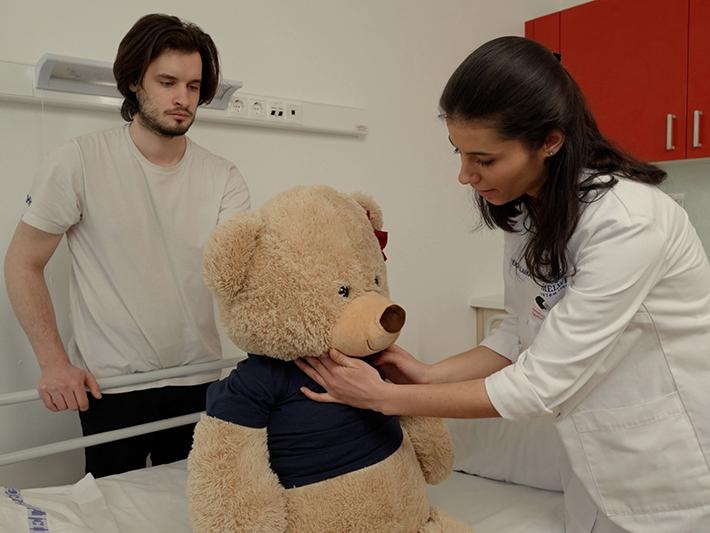Staff-mobility programmes greatly influenced the course of our careers and challenged us to grow personally and professionally. Shelini was first introduced to the opportunity of exploring new cultures and travelling through the staff-mobility programmes promoted at her university. Her passion for experiencing diverse cultures took her to China, Helsinki and the US during her PhD to attend workshops and have new teaching experiences.
When she joined the University of Surrey in 2020, Shelini quickly signed up for the Erasmus+ staff-mobility scheme. Through this programme, she embarked on three transformative trips abroad: she participated in a mindfulness workshop in Romania, gaining global networking and work-life balance insights; in Sweden, she discovered student hackathons that offered students credits and prizes, inspiring her to establish a similar programme at her university; her immersion in the local culture of Trinidad and Tobago led to a collaborative online international learning (COIL) project involving students from Surrey and Trinidad. Her times abroad exemplify the personal enrichment and professional growth that staff mobility programmes can offer.
- Tips for mastering the Global Shared Learning Classroom
- Bringing international and intercultural dimensions into your programmes
- Social mobility via social media: opportunities for career services
Meanwhile, Paul used staff mobility to fortify research connections, engaging in exchanges across Brazil, Germany and the US, focusing on cancer health. The mobility experiences allowed him to build his professional network and exchange ideas in science. He was able to develop his confidence in laboratory techniques and build up his scientific portfolio.
The benefits of staff-mobility programmes
Just as mobility exchanges bring unique benefits to students’ learning experiences, staff mobility exchanges can open your mind to new ways of working. Including:
- New research collaborations: diverse collaborations spark fresh insights and growth in research
- Fostering cultural understanding: interactions with diverse cultures cultivate empathy, tolerance, cultural understanding and inclusivity among educators
- Professional development: mobility programmes offer growth through seminars, workshops and courses, enhancing teaching skills and competence
- Skill development: exposure to diverse teaching environments hones skills such as adaptability, intercultural communication and problem-solving
- Elevated teaching quality: new insights enable educators to share best practices and fresh perspectives with their departments upon return.
How to set up a staff mobility exchange programme
With the loss of Erasmus+ funding to the United Kingdom, it’s crucial for UK universities to explore cost-effective avenues for both in-person and online mobility exchanges. Consider starting with teacher exchanges with nearby universities or any institutions with which you have an existing partnership. Seek financial support for short academic exchanges.
Before you create a teacher exchange programme, set goals and objectives. Do you aim for participants to partake in knowledge sharing? Cultural immersion? Curriculum development? Research collaboration? Or something else?
Look for institutions that are aligned with your focus, academic approach and shared interests. Reach out to them and express your interest in establishing a staff mobility exchange programme, highlighting the mutual benefits of the partnership. Emphasise how it contributes to professional development, cultural understanding and educational enrichment for both parties.
Hammer out the practical details, including the length of the exchange, specific activities that it will involve (such as teaching specific courses, conducting research or cultural immersion activities) or any responsibilities the staff will have (for example, attendance at department meetings, submission of progress reports or active engagement in the host institution’s academic community).
Once you have agreed on the length of stay, objectives and finances of an exchange, draft terms and conditions for the partnership, with help from your international office, that include the post’s responsibilities, expectations and any financial arrangements.
Ensure staff attend pre-departure orientation sessions and receive comprehensive guides. These should cover cultural sensitivity, administrative procedures, host institution requirements and practical aspects such as navigating daily life (grocery shopping), obtaining local communication (how to get a SIM card) and understanding customary gift-giving practices.
If going abroad is too much of a stretch, online mobility initiatives can be incredibly impactful. Start small with a pilot study, focusing on a specific theme, and bring together educators from around the world for virtual career and professional development sessions. The Active Learning Network, for example, is currently piloting a virtual teacher exchange programme across 50 institutions globally. This initiative pairs educators from diverse backgrounds in a buddy system, fostering best practice exchange and mutual mentorship on a bi-monthly basis, without any costs.
How to overcome resistance to staff mobility programmes
There are many obstacles to going abroad. Time constraints, administrative duties, workloads and childcare responsibilities can all get in the way of these enriching experiences. Some staff might be resistant, have funding concerns or face logistical hurdles.
It’s crucial that programme leaders emphasise the long-term benefits of staff mobility and how it contributes to a more internationally focused teaching career. Clear communication and awareness-raising efforts within the institution are essential to address these concerns. Share past success stories and note that a mobility trip could be paired with student recruitment or research collaborations, ensuring financial justification and added value.
Securing financial support for staff mobility programmes
Begin by exploring institutional budget allocations within your college or school. Additionally, reach out to your international exchange office to enquire about existing funding opportunities. Seek external stakeholders who might be interested in supporting such initiatives – we recently went on a trip to India and one university we visited had institutional funds to bring in teaching staff for knowledge exchange.
Craft a compelling case for your mobility, outlining the purpose of the trip, anticipated gains and how that knowledge and insight will be put into practice when you return. Share success stories and highlight the tangible benefits that staff mobility brings to the institution.
The decision to go abroad is a powerful catalyst for personal and professional growth, providing a gateway to a world of knowledge, experiences and connections. By taking the leap, we can transform our teaching practices, broaden our horizons and contribute to a more globally engaged academic community. Universities can help staff to embrace these opportunities through clear planning, financial support and relevant pre-departure information.
Shelini Surendran is the associate dean for the Faculty of Health and Medical Sciences, International at the University of Surrey.
Paul Townsend is the executive dean for the Faculty of Health and Medical Sciences at the University of Surrey.
If you would like advice and insight from academics and university staff delivered direct to your inbox each week, sign up for the Campus newsletter.




comment